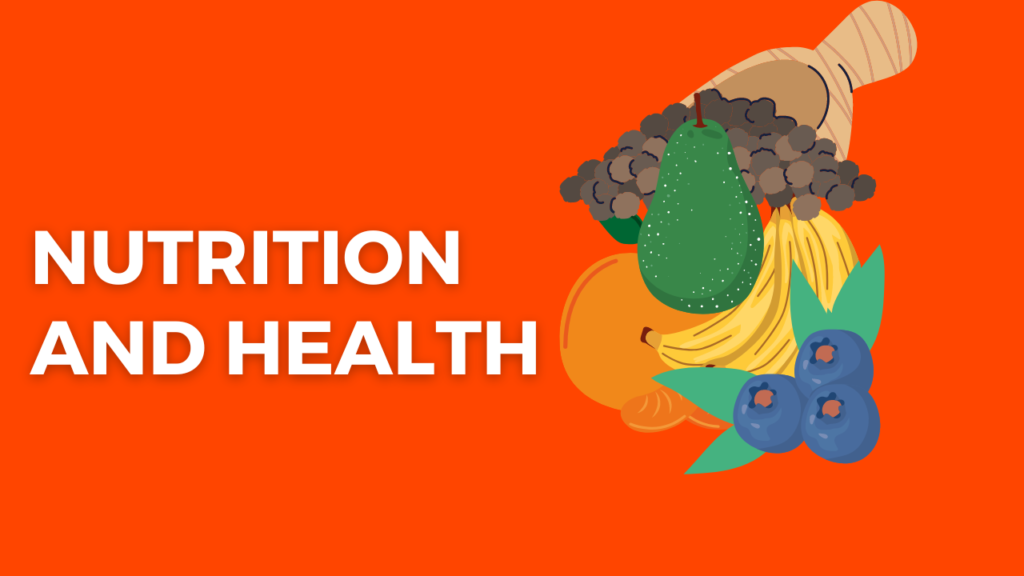Nutrition and Health

Introduction
Nutrition plays a crucial role in maintaining good health across all stages of life. Here are several aspects where nutrition significantly impacts health:
1. Chronic Disease Prevention and Management:
- Heart Health: A diet rich in fruits, vegetables, whole grains, and healthy fats can reduce the risk of heart disease.
- Diabetes Management: Monitoring carbohydrate intake and choosing low glycemic index foods can help manage blood sugar levels.
- Hypertension: Reduced sodium intake and increased potassium from sources like fruits and vegetables can help manage blood pressure.
2. Weight Management:
- Balanced Diet: Combining nutritious foods with portion control and regular physical activity supports healthy weight management.
- Understanding Macronutrients: Learning about the roles of carbs, proteins, and fats in maintaining a healthy weight.
3. Gut Health and Immunity:
- Fiber and Probiotics: These support a healthy gut microbiome, which plays a significant role in immune function and overall health.
- Impact of Diet on Inflammation: Certain foods can either promote or reduce inflammation in the body, affecting overall health.
4. Bone Health:
- Calcium and Vitamin D: Understanding their importance in bone health and sources in the diet to prevent conditions like osteoporosis.
5. Brain Health and Cognitive Function:
- Omega-3 Fatty Acids: These are linked to brain health and may reduce the risk of cognitive decline.
- Antioxidants: Found in various fruits and vegetables, they can potentially protect brain cells.
6. Mental Health:
- Role of Diet: Exploring how certain nutrients (omega-3 fatty acids, B vitamins, etc.) can impact mood and mental health conditions like depression and anxiety.
7. Pregnancy and Early Childhood Development:
- Nutrient Needs: Understanding the crucial nutrients required during pregnancy for fetal development and the impact of early nutrition on a child’s health.
8. Aging and Nutrition:
- Nutritional Needs: Understanding how nutritional needs change with age and how a balanced diet can support healthy aging and prevent age-related conditions.
9. Food Allergies and Intolerances:
- Impact on Diet: Understanding how allergies and intolerances can affect dietary choices and overall health management.
10. Nutrition Education and Public Health:
- Community Programs: Discussing the importance of education and accessible nutritional information in promoting healthier eating habits on a larger scale.
Nutrition is a powerful tool in preventing various diseases and promoting overall well-being. Understanding the impact of food choices on health empowers individuals to make informed decisions for themselves and their families.
Nutrition and health are intricately connected, with the food we consume playing a crucial role in our overall well-being. Here are some aspects of the relationship between nutrition and health that you might find interesting to explore:
1. Balanced Diet and Nutrient Intake:
- Essential Nutrients: Understanding the importance of macronutrients (carbohydrates, proteins, fats) and micronutrients (vitamins, minerals) in maintaining health.
- Dietary Guidelines: Exploring national and international dietary recommendations for optimal health.
2. Prevention of Chronic Diseases:
- Heart Health: Examining the impact of dietary choices on cardiovascular health, including the role of fats, cholesterol, and sodium.
- Diabetes Management: Discussing the relationship between blood sugar levels and dietary factors, emphasizing balanced carbohydrate intake.
- Cancer Prevention: Investigating how certain foods and dietary patterns may contribute to or protect against cancer.
3. Weight Management:
- Obesity and Nutrition: Exploring the role of diet in the prevention and management of obesity.
- Healthy Eating Habits: Discussing mindful eating, portion control, and strategies for maintaining a healthy weight.
4. Gut Health:
- Microbiome and Nutrition: Understanding the impact of diet on the gut microbiota and its implications for digestion, immune function, and overall health.
- Fiber and Digestive Health: Exploring the benefits of dietary fiber in maintaining a healthy digestive system.
5. Mental Health and Nutrition:
- Brain-Boosting Foods: Examining the relationship between certain nutrients and cognitive function.
- Diet and Mood: Investigating how diet may influence mental health conditions such as depression and anxiety.
6. Special Diets and Conditions:
- Gluten-Free, Dairy-Free, etc.: Discussing the reasons behind and implications of specific dietary restrictions.
- Nutrition for Specific Health Conditions: Exploring tailored diets for conditions like hypertension, osteoporosis, and autoimmune diseases.
7. Lifestyle Factors:
- Physical Activity and Nutrition: Highlighting the synergy between regular exercise and a balanced diet in promoting overall health.
- Sleep and Nutrition: Discussing the impact of sleep on dietary choices and metabolism.
8. Public Health and Nutrition Policies:
- School Nutrition Programs: Examining the role of nutrition in school settings and its impact on children’s health.
- Governmental Initiatives: Exploring policies aimed at promoting healthier food choices and combating nutrition-related health issues.
9. Nutritional Education and Literacy:
- Promoting Healthy Eating Habits: Discussing the importance of nutrition education in fostering informed food choices.
- Addressing Food Deserts: Exploring efforts to improve access to nutritious foods in underserved communities.
Understanding the intricate connections between nutrition and health is essential for individuals, healthcare professionals, and policymakers alike. Whether it’s preventing chronic diseases, maintaining a healthy weight, or supporting mental well-being, the role of nutrition in overall health is vast and multifaceted.






